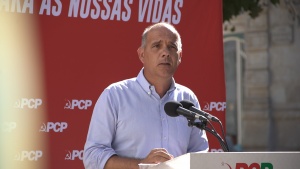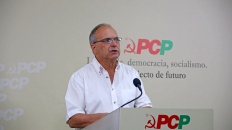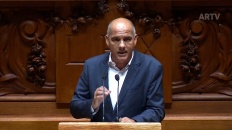I would like to begin by underlining the timeliness of this initiative at a time when thousands and thousands of people are struggling to access or maintain housing.
A situation that rightly worries so many men and women living in our country.
It worries those who have a rented home and are faced with rent increases or risk eviction.
It worries those who have loans and see the mortgage payments rise to unaffordable values.
It worries the more than 70 thousand families who live without decent housing.
It worries students and their families, grappling with the lack of public student homes, facing a real inferno of speculation.
It worries all democrats who are faced with yet another attack on a right enshrined in the Constitution of the Portuguese Republic.
If the PCP's proposals had been adopted and implemented, today the situation would be different.
Of course, not all problems would be solved, but the situation in which everyone finds themselves today would certainly be different and for the better, less pressured, without constantly being worried sick.
The guarantee of the right to housing was always present in our intervention. An intervention that has become even more necessary in view of the escalation of prices and interest rates, the increase in the cost of living, and the growing difficulties faced by both tenants and those who have bought their own homes.
Today's situation is inseparable from the dominant economic model, an economic model based on obtaining the greatest possible profit, on transforming housing into a commodity, even at the expense of an essential good and right such as housing.
A situation supported and sustained by the political choices of successive governments that have acted, in what is central, in complete submission to the interests of economic groups, to the impositions of Brussels, the European Union and the ECB.
As regards interest rates, eight increases have already been decreed by the ECB and they have already been warning that it will not stop here.
The interest rate increases and the pressure on wages will not stop here, even knowing that inflation is not due to wages and pensions and that it is being used by economic groups, especially the banking sector, to further expand profit margins.
For these people, the drama that this represents for more than a million families is completely indifferent, many of them living this drama in silence and isolation.
And behold the beaming faces of the bankers. Some smile with their 85 million euros in profits, others laugh on top of their 180 million euros and there are still those who roll over the floor laughing, looking at the 215 million euros in profits, just in the first three months of the year.
Millions of people being squeezed, millions of profits for the bank.
These are the consequences of the ECB's choices, the EU's orders and the government's submission, supported by PSD, CDS, Chega and IL.
Now they can all come together and pretend to quarrel with the ECB, but the truth is that all of them are not only willing to follow the directives but are enthusiastic about putting them into practice.
This is not what the Country needs.
What the Country needs is a policy and a government that stands up to the ECB and the EU, a government that is not the steward of the interests of the banks and economic groups,
What the Country and each one of us needs is a policy and a government that places the interests of the Country and of those who live and work here at the centre of its action.
A government that, instead of excuses and pretexts, which always serve to justify the impoverishment of large sections of the population and the concentration of profits in economic groups, confronts the EU's options, defends the interests of the people and the Country.
The structural measure to face the great challenges we are facing, also in housing, the great national emergency to respond to the increase in the cost of living, is the general increase in wages.
This is where we need to go, raising wages and pensions, public investment, greater fiscal justice, tax relief for those who work and have worked, and effective taxation of economic groups and their profits.
A path that effectively guarantees access to housing, particularly for hundreds of thousands of young people who see their studies and life plans postponed.
Housing cannot be subject to the greed of real estate funds and banks.
The State has an obligation to face speculation and has the duty that it alone has, to develop long-term public housing policies and guarantee territorial and social cohesion in access to housing.
The current situation requires, in addition to medium and long-term measures, immediate solutions that tackle the problem in three dimensions: rents, mortgage instalments and access.
It is in this sense that we have presented concrete proposals.
It is indeed curious and sad that, faced with concrete proposals, and after the strong and loud words, of the Prime Minister and even, amazingly, of the president of the PSD, against the ECB, at the first opportunity that both had to move from words to deeds, when they had at their disposal the PCP's proposals that reflected concrete measures that faced the ECB and defended and safeguarded people, they chose, unfortunately and as always, to side with the ECB, the EU and interest rate hikes.
One could say that the words were many, tough and in a determined tone, but then came the wind and that's what we saw.
Our proposals were rejected but they remain more topical.
With the exception of reinforcing the resources of the Housing and Urban Rehabilitation Institute, all our proposals have been successively rejected.
Sometimes with tactical abstention, otherwise with a vote against, there we have PS, PSD, Chega and IL fulfilling their role as a service committee for the protection and defence of the interests of economic groups.
We do not give up on them, but what is necessary is that each one, each structure, each person, assume these proposals as their own, demand them, increase with their action, with their strength, the pressure to materialise them.
Measures that guarantee a significant State funding, in the promotion of public housing and the full use of RRP funds.
That progress is made in fact and not just announcements in the recovery and rehabilitation of public properties that can be used for housing; refurbishment and recovery of vacant private properties, of which there are more than 48,000 in Lisbon alone, using existing administrative takeover mechanisms, ensuring quick investment in student accommodation by expanding the number of public student residences.
What is needed is to limit the value of rents in new leases, prevent evictions and repeal the law that gives them shape, imposed by the PSD/CDS Government.
What is needed, and increasingly urgent, is to put the bank's profits to bear the rise in interest rates, to make Caixa Geral de Depósitos function as the public bank that it is, setting a maximum spread of 0.25% on credit to housing, create a moratorium, like the one that existed during the epidemic.
These are the concrete and immediate measures that are needed.
We don't need more propaganda, propaganda doesn't pay the rent, pay mortgages or put food on the table.
The “More Housing” package is an example of this, propaganda.
Weeks and weeks of discussion, an approach centred on false polemics passing by the essentials and, after all this time, “More Housing” is what we had warned it would be, a package of “more transfers” for real estate funds, more means for banks.
After well squeezing the government measures, which in the central issues is accompanied by the other members of the so-called service committee: it maintains the “law of evictions”; bypasses conditioned rent programmes; it does not regulate rents and worse, even measures that could help are in the process of being revised, justly frustrating expectations created in supporting rents; the bank guarantees its profits with more transfers of public money via interest subsidies and is once again getting away without a single measure that may pinch its 10.7 million euros in profits per day; it does not touch on tax benefits for investment funds and so-called non-habitual residents; adds more tax benefits to landlords; advances, following the asking of the Portuguese Confederation of Building and Real Estate, for the liberalisation of construction licensing, with all that this implies.
Well squeezed, the “More Housing” package translates the basic options: the market must be the great manager of housing; the State must finance real estate interests through financial support and tax benefits, urban rules and criteria must be lightened in order to open the field to all types of schemes involving real estate speculation.
The banks continue to hoard, the ECB to order, the EU to determine, and thousands and thousands of people grappling with rising rents and mortgage payments and without decent housing.
Like the saying “we are all in the same neighbourhood, some in the posh villa and others in the backyard annex”.
This cannot, this will not go on like this.
Housing is a right; it is not a mere commodity destined for big business and the State has responsibilities and must assume them.
Yes, let bank profits pay for interest increases, regulate the value of rents and prevent new increases, put an end to easy evictions, promote the availability of public housing, put an end to the non-habitual resident regime and the Golden visas, increase wages and pensions and we are certain that the problems of access to housing will be solved.
It is necessary to carry out an option for the people, for families, for those who every day do everything possible and impossible to guarantee their greatest asset, the house, the roof to live under.
The fact is that the rent and mortgage instalment is the last thing that everyone stops paying.
They stop dining out, going to the movies, going on vacation, then they cut down their food expenses, then the electricity and gas bills remain unpaid, and, at the limit, the last thing each one does is stop paying for the home.
Thousands of people today are in this situation every day and every month.
It is this drama that must be faced with determination.
Count on the PCP for this fight, for housing, for a better life, for the Country.
A fight that involves the mobilisation of all, as has been happening and that needs to be intensified.
It is here that the consecration of the right to housing is decided.























